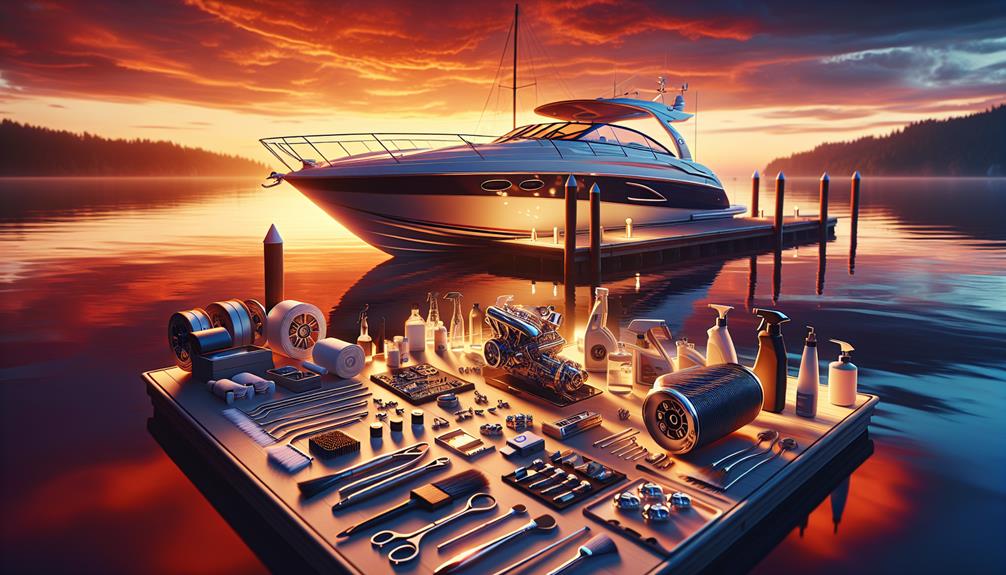If you're contemplating purchasing a boat, be prepared to ponder the perpetual question of how much it will cost to maintain. The initial purchase price may seem like a significant investment, but it's merely the beginning of your financial voyage.
How Much Does A Boat Cost To Maintain
From routine maintenance costs to unexpected repairs and upgrades, the expenses can accumulate faster than you can say 'shipshape.'
How Much Does A Boat Cost To Maintain
And that's not all – storage and docking fees, fuel and operating expenses, and a myriad of other factors can impact the overall cost of maintaining your beloved vessel.
How Much Does A Boat Cost To Maintain
So, before you set sail, let's explore the depths of this topic and uncover the true extent of what lies beneath the surface.
How Much Does A Boat Cost To Maintain
Key Takeaways
How Much Does A Boat Cost To Maintain
- The initial purchase price of a boat varies greatly and includes costs such as the boat itself, financing, insurance, and additional equipment.
- Routine maintenance is essential to prevent costly repairs and should include tasks such as regular cleaning, engine servicing, and budgeting for repairs or replacements.
- Repairs and upgrades may be necessary over time, and it is important to assess one's skills before attempting DIY repairs to ensure safety.
- Storage and docking fees can vary based on location and amenities, and it is important to consider costs such as marina fees, storage rentals, and winterization.
Initial Purchase Price
How Much Does A Boat Cost To Maintain
How much does the initial purchase of a boat typically cost?
How Much Does A Boat Cost To Maintain
Well, the cost of buying a boat can vary significantly depending on various factors such as the type, size, age, and condition of the boat. On average, you can expect to spend anywhere between $10,000 to several million dollars for a boat.
When it comes to financing options, there are a few different routes you can take. Many people choose to take out a boat loan, which is similar to a car loan, to finance the purchase of their boat. This allows you to spread out the cost over a set period of time and make monthly payments. It's important to consider the interest rates and terms of the loan to ensure it aligns with your financial situation.
In addition to the initial purchase price, it's crucial to factor in the insurance costs. Boat insurance is a necessary expense to protect your investment and provide liability coverage in case of accidents or damages. The cost of insurance can vary depending on factors such as the type of boat, its value, and your boating experience. It's recommended to shop around and compare quotes from different insurance providers to find the best coverage at a competitive price.
Routine Maintenance Costs
To properly maintain a boat and keep it in optimal condition, regular routine maintenance is essential. Not only does routine maintenance help prevent larger, more costly repairs down the line, but it also ensures the safety and longevity of your boat. While maintenance costs can add up, there are ways to save money and perform many tasks yourself through DIY maintenance.
One of the most cost-saving tips for routine maintenance is to establish a regular schedule and stick to it. This allows for early detection of any issues and timely repairs, preventing them from escalating into more expensive problems. By regularly inspecting and cleaning your boat, you can identify any potential issues before they become major headaches.
Another cost-saving measure is to tackle simple maintenance tasks yourself. This includes tasks like changing the oil, replacing filters, checking and replacing spark plugs, and cleaning the boat's exterior. Many of these tasks can be done with basic tools and a little research, saving you money on labor costs.
Additionally, proper storage and cleaning practices can greatly reduce maintenance costs. Protecting your boat from the elements and keeping it clean not only preserves its appearance but also prevents damage and corrosion. Taking the time to wash and wax your boat regularly will pay off in the long run.
Repairs and Upgrades
Now that you have established a regular maintenance routine and saved money by performing basic tasks yourself, let's shift our focus to the important topic of repairs and upgrades for your boat. Proper maintenance is crucial to keep your boat in good condition and minimize the need for major repairs. However, there are times when repairs and upgrades are necessary to enhance your boating experience.
Here are four key points to consider:
- Types of boat repairs: From minor fixes like repairing a leaky faucet or replacing a broken latch, to more complex tasks such as fixing engine issues or repairing hull damage, there's a wide range of repairs that may be required for your boat. It's important to address these repairs promptly to prevent further damage and ensure the safety of your vessel.
- Importance of regular boat maintenance: Regular maintenance not only helps prevent major repairs but also extends the lifespan of your boat. By following a routine maintenance schedule, you can identify and address minor issues before they become costly repairs. This includes tasks such as cleaning, lubricating, and inspecting various components of your boat.
- Upgrades for improved performance: Upgrading certain components of your boat can enhance its performance and functionality. This may include installing new electronics, upgrading the engine, or adding features such as a fish finder or a sound system. Upgrades can also increase the value of your boat if you decide to sell it in the future.
- DIY vs. professional repairs: While some repairs can be done by yourself, others may require the expertise of a professional. It's important to assess your skills and knowledge before attempting complex repairs. Hiring a professional ensures that the repairs are done correctly and safely.
Storage and Docking Fees
Storage and docking fees for your boat can vary depending on various factors such as location, size of the boat, and amenities provided by the marina or storage facility. Marina fees typically cover the cost of storing your boat in a secure location and providing access to essential services. The fees can range from a few hundred dollars to several thousand dollars per year. Larger boats generally incur higher fees due to the amount of space they occupy.
In addition to the size of your boat, the location of the marina also impacts the cost. Marinas in popular tourist destinations or urban areas tend to have higher fees compared to those in more remote or less popular locations.
Maintenance costs are an essential consideration when budgeting for storage and docking fees. Regular maintenance helps keep your boat in excellent condition and minimizes the risk of expensive repairs. The cost of maintenance can include routine tasks such as cleaning, painting, and engine service. It's important to factor in these costs when calculating the overall expenses of owning a boat.
Additionally, some marinas may offer additional amenities, such as electrical hookups, fueling stations, and security features, which can add to the overall cost but may enhance the convenience and enjoyment of your boating experience. When selecting a marina or storage facility, it's crucial to evaluate the available amenities and services and consider how they align with your specific needs and budget.
Fuel and Operating Expenses
Fuel and operating expenses are a crucial aspect of boat ownership, requiring careful consideration and budgeting. When it comes to keeping your boat running smoothly and efficiently, there are a few key factors to keep in mind:
- Boat fuel efficiency: One of the most significant expenses you'll encounter is fuel. Different boats have different fuel requirements, so it's important to choose a vessel that aligns with your budget and usage. Consider factors such as engine size, weight, and hull design to find a boat with good fuel efficiency.
- Proper maintenance: Regular maintenance is essential for keeping your boat in top shape and preventing costly repairs down the line. This includes regular engine servicing, cleaning, and checking for any signs of wear and tear. By staying on top of maintenance tasks, you can ensure that your boat operates efficiently and minimizes fuel consumption.
- Navigation and safety equipment: To ensure a safe and enjoyable boating experience, you'll need to invest in navigation and safety equipment. This includes GPS systems, charts, life jackets, fire extinguishers, and more. While these expenses may not directly relate to fuel consumption, they're necessary for responsible boating and should be factored into your overall budget.
- Budgeting for boat expenses: It's important to set aside a specific budget for fuel and operating expenses. Consider factors such as the frequency of your boating trips, the distance you plan to travel, and the current cost of fuel in your area. By planning ahead and setting realistic expectations, you can avoid any financial surprises and ensure that you can enjoy your boat without breaking the bank.
Conclusion
Maintaining a boat is no small feat. From the initial purchase price to routine maintenance costs, repairs, and upgrades, the expenses can quickly add up.
Don't forget about storage and docking fees, as well as fuel and operating expenses. It's like trying to tame a wild sea monster while juggling flaming torches – a truly Herculean task.
So, if you're considering owning a boat, be prepared for the financial commitment that comes with it.

